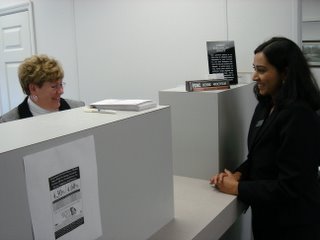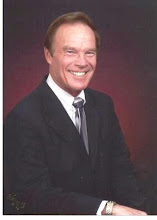
Every time I direct a seminar on Presentation Skills for corporations, government agencies, banks, hospitals and other groups, I begin by talking about Stage Fright—because I know that’s the number one concern speakers feel.
Among the guidelines I share about stage fright--guidelines I learned during a decade as a full-time professional speaker--this may be the most helpful one: Make the right choice.
You see, speakers have three choices when they stand up to speak.
First, they can focus on themselves entirely. Their self-talk goes something like this:
“What if they don’t like me?”
“Did I wear the right outfit, or is this too informal?”
“Sometimes I stammer when I get excited. That could happen right now.”
“Are they paying attention, or do they seem distracted?”
All right, what’s the result of this choice?
Every mistake becomes magnified in importance.
We get so wrapped up in performance that we forget what we want to achieve.
“Paralysis by analysis” turns us into robotic reciters, not speakers.
The speaker’s second choice: Focus on the audience
To begin with, change your opinion about audiences. Too often we think of an audience as a room full of critics, ready to analyze our every word and gesture. Really, though, the vast majority of listeners are not critics—they are your cheerleaders. They want you to succeed. They are glad you are the one up there speaking, not them. Too, from experience they know how uncomfortable an event is for everyone involved if the speaker fails.
Then pick out the most responsive listeners as soon as you can. They are easy to find. They are attentive, usually smiling and physically alert. Their supportive nonverbal communication elevates your confidence. Look at them frequently to draw strength from their feedback.
Involve the audience when you can. Today’s audiences don’t want to be passive. Even in my convention keynote speeches, I ask participants to shake hands, raise their hands, stand up and stretch or carry out brief assignments as partners.
Your third choice: Focus on the message.
Haven’t you noticed that when you are genuinely involved in your message, when you are determined to persuade others about your conviction, that speaking changes from a chore to a privilege? Your creativity increases, and you come up with catchy word combinations you had not planned. Your adrenalin flows, and you become animated on the platform. You are not preoccupied with the impression you are making. Yet, amazingly, you become more impressive than ever.
Now then, which of these three choices have you usually made when you face an audience?
If you have selected the first option, you have made yourself highly susceptible to Stage Fright. On the other hand, when you focus on your audience (as a friendly, receptive group of people who want you to succeed) and your message (as a deeply held conviction you can hardly wait to share with others), you will feel competent, confident and committed. Not only will you sense this, your audience will. That's when speaking becomes exciting and productive.
For some of my other tips on “How to Become a Dynamic Speaker!” I suggest that you order my recently-produced audio CD that carries that title. For thirty-five minutes, Doug Smart, CSP, another professional speaker, interviews me on this vital topic. You can read a description of this CD and place your order at:
http://www.commlampton.com/store/index.htm
And here's a book I recommend highly: You Are the Message, by Roger Ailes. Available in paperback and audio CD. Ailes was a speechwriter for the first President Bush and Ronald Reagan. He has been a speech coach for nationally famous CEOs. Now he is President of Fox News. I totally endorse his approach to public speaking.
For more information, please visit my Web site:
http://www.championshipcommunication.com/










